We are not afraid.
We are not afraid.
We will march for liberation
Because we know why we were made. *
As our group of interfaith leaders came nearer to the line of Border Patrol agents on Monday, all while singing these words over and over, I thought of the conversations I’ve had with many of you about the meaning of courage, and courageous love.
As in, how courage does not mean necessarily mean, we are not afraid. Because, while there may have been people on the beach that afternoon who believed the words we were singing, I was not one of them.
We had spent over four hours in trainings the day before, preparing for the moment when we would near the border wall – and by the way, there is already a wall on our southern border. I don’t know why more of the media does not speak about this when they report on the President’s call for a wall. There is already a wall along the border. In some cases, two walls. But, of course, none of these walls (I guess we’ve decided to call them “fences”) are the height and grandiosity of the wall the President has in mind. Which is a 30-foot concrete wall. The height that studies show cause disorientation in anyone attempting to climb them.
Our training the day before had anticipated that we would move into the restricted area to get near the wall where migrants on the other side would be there to receive a blessing from those of us willing to risk arrest. Arrestables, they called us.
(Below, a photo of a bunch of arrestables, starting with the picture on the bus with Rev. Sara Lawall, minister of the UU Church in Boise, and then on the march to the border. Apologies in advance to Sara – and to Rev. Megan Dowdell who I was also marching with – I told them after I took the picture that they were in the shot. They were both, by the way, not just arrestable, but were 2 of the 32 who were arrested.)
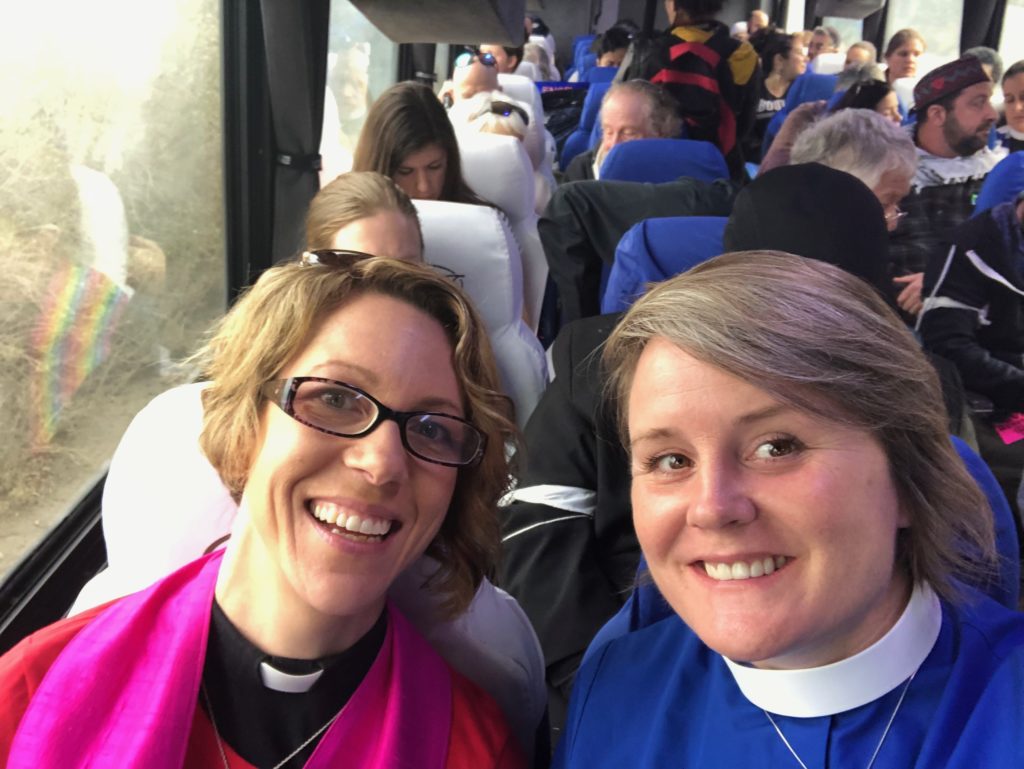
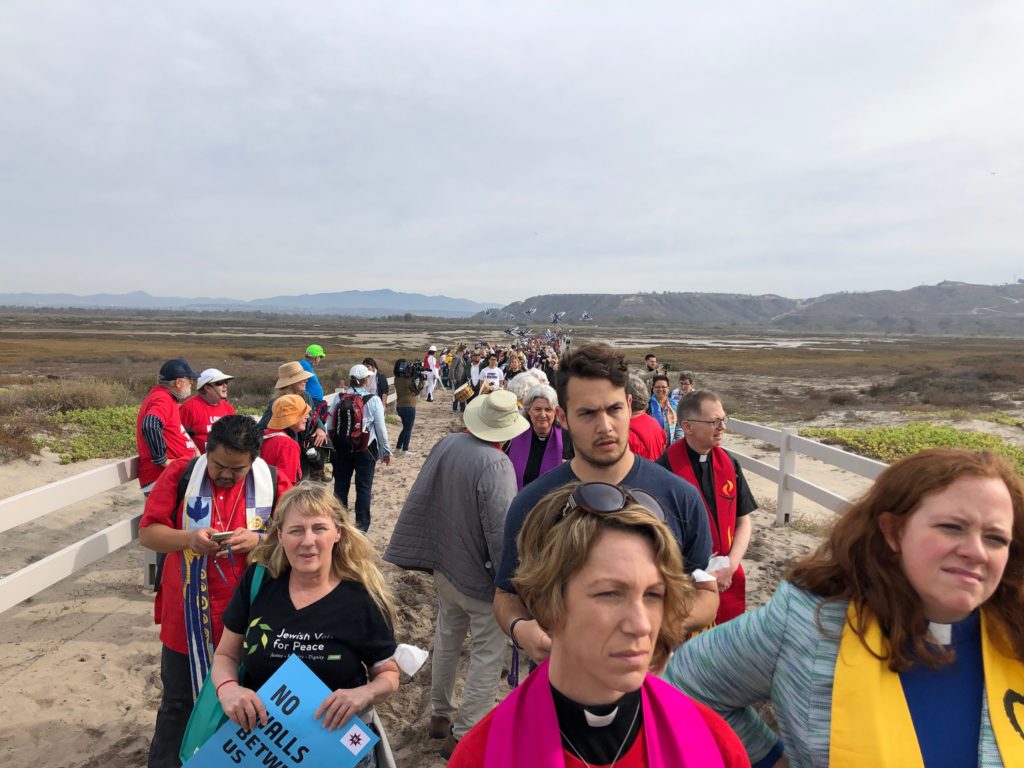
We assumed that at some point it was likely that Border Patrol would tell us to stop, tell us that we would be arrested if we proceeded. But we did think that most of the 100 or so of us “arrestables” would make it to the zone before that happened.
However, that was not the way it happened. Instead, as we approached the concertina wires, we saw in front of us, a line of agents already lining up from the end of the wires to the lapping of the waves. Border Patrol agents in full military gear, carrying large weapons, stone faced.
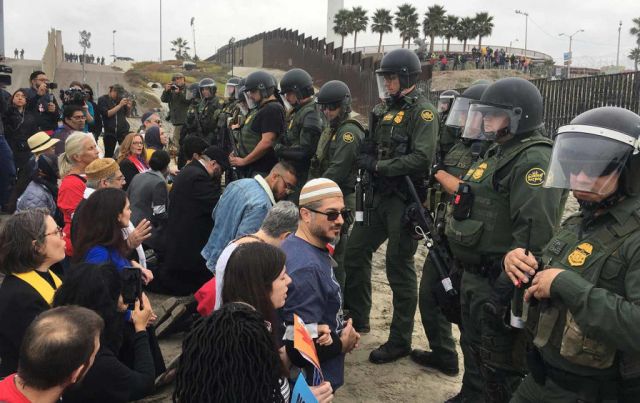
As we got nearer, the group began to sing this song that we had sung earlier, over and over:
We are not afraid….for we know why we were made…
I’d been writing the script for Christmas Eve on the plane ride to San Diego, so I was also thinking about the many times in Christian scripture that people are reassured: be not afraid. Usually with a promise that God was present with them. So with that, plus remembering our wrestling together over this idea of courage, I felt – not without fear, but also, connected to that sense of courageous love.
Singing with Rabbis and Priests, Imams and Catholic workers, UU ministers; veterans, activists, immigrants, citizens. Some of whom I count as friends and colleagues, some I know and admire from a distance, some were strangers that I had just come to understand as community and partners. All of us held in courageous love – arms open, praying, singing, clear, steady. Including me.
And then, just as quickly, all that fell away. An agent got aggressive, or another friend was pulled across the line and arrested, or the agents yelled back up! while moving towards the rows of us singing and praying. And I was afraid again, and unsure, disoriented, and disconnected.
Put this back-and-forth on repeat, and you’ll understand my experience for about 2 hours in prayer and in protest facing down a row of increasingly aggressive agents at the border.
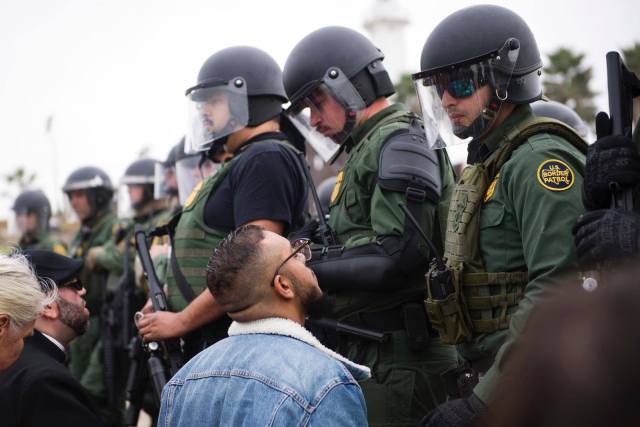
My children, trying to make sense of what I had just done, asked me today if our event would make any difference. If the migrants would be treated better. If children would stop being separated from their families. They meant, right away. I said, probably not. So, why did you go, they wondered?
My daughter – coincidentally – just finished a unit on non-violent resistance in her social studies class, but still, it’s not immediately easy for her, or my son, to understand. We tell them all the time to follow the rules and to obey the law, how important it is to avoid the criminal justice system – and here their mom was willingly risking arrest – and not even managing to ensure that a single child was able to reunite with their parent, or that a family would find the freedom and security they came seeking.
I told them that sometimes, a law made by the government is not the same as a law that we know is right in our hearts. I reminded them about slavery, and about how it was legal. And that it took a lot of people, willing to risk their own safety and their own lives, a lot of years of protest and breaking the government law, in order to make sure that the laws of our hearts would not be broken any more.
I told them that as a minister, sometimes my presence and my voice matters a little extra, because it helps people remember those laws of our hearts.
And I told them that we were there to keep reminding people that what is happening at our border – it’s not right. Even though it might take a long time for people to listen, that doesn’t mean we shouldn’t speak up, or act, it just means that we have to be patient, and try to just keep doing our part.
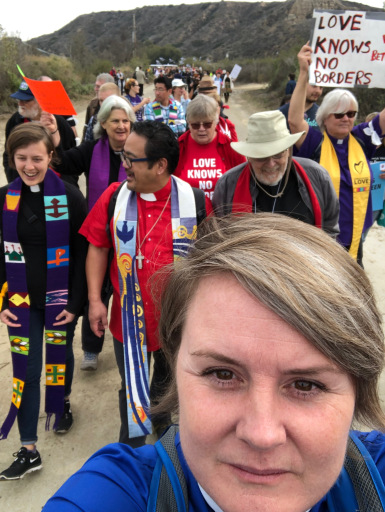
My daughter – whose birth father was a Mexican immigrant – asked me then, if she went to the border, would people be confused, and think she was not a US citizen. How would she be treated, she wondered?
I flashed on the Uber driver, a US citizen born and raised in San Diego with his 15 siblings, who told me last night that he carried his birth certificate with him wherever he went. Because you just can’t trust anything these days, he said.
I don’t know, to be honest, I told my daughter. It’s not fair, and it’s not right, because you are a US citizen, and really no one should have to wonder how they will be treated – regardless of where they were born – but that’s why we need to keep fighting for a different way. And if we don’t get there, then your generation will have to keep trying. And then the next.
As Nelson Mandela has said, “It seems impossible until it’s done.”
And one day, it will be done.
And then, if like our world today, things that were once done become undone, then we march again.
This is what I didn’t even try to explain to my children. That it was not always like this. That 9/11, and the increased migration due to climate change and total governmental chaos in central America (often fueled by US policies and intervention), and the recent rise of right-wing fascism and racism across the globe has changed everything.
For example, Border Field State Park where we marched. Right where we were kneeling in the sand, where I was both afraid and not afraid, where 32 people were arrested in their attempt to bless the people on the other side. Before it was a “constitution free” restricted zone, it was a place where First Lady Pat Nixon dedicated Friendship Park. At the time there was a small, three wire fence, which she pointed at and said she hoped would not be there long.
After the wall was completed in 2011, families still came to greet each other through the slats – they’d have picnics and birthday parties and reunions on either side. But in recent years, even this has ended, with the concertina wire and the Border Patrol agents ensuring that no one can get anyone near the wall without risking arrest.
Another example, another story from an Uber driver, this one on the way to the airport this morning. He told me that for a long time he and his family thought of themselves as residents of Tijuana and San Diego – they lived in Tijuana, went to school in San Diego – and vice versa – for the whole of his growing up. He was probably about my age. But in the past few years, he had to choose. He lives in San Diego. But because he feels his home is both of these places, and in the border itself, he actually feel like he has no home. No country.
It is amazing how quickly we can normalize what is actually abnormal. Adapt to what is incredibly dehumanizing. Those who profit in money and power from these policies count on it. And they count on the power of fear to ensure we won’t wake up to other possibilities. It’s another reason for the 30-foot wall. It is a monument to fear. Just ask Gaza.
By our faith, however, we know that none of this is inevitable. Our Unitarian Universalist faith reminds us that we have a choice about how we will respond to those seeking refuge, how we will treat these thousands of vulnerable people – who will not stop coming just because we put up a bigger wall. Climate change and the ever-increasing presence of extreme poverty and violence across the globe will ensure that migration is a constant.
And it’s a constant that doesn’t need to be a problem to be solved. The people arriving at the borders are people, after all. People with gifts and skills and drive and imagination and heart. People who can contribute towards solving our shared challenges in ways we have not yet even dreamed.
Besides, the cost of military deployment to the border ($200 million and counting), border patrol itself ($3.8 billion annually), or its sister agency Customs and Border Protection ($13.2 billion annually), or the cross-country efforts of Immigration and Customs Enforcement ($6.1 billion annually) – not to mention the continuous attempts at constructing an “even-better” wall (so far, about $6 billion appropriated). Put all that together and you could provide temporary housing, social workers, therapists, and spiritual care for many, many, many people.
I know, these seem like wild ideas far out of touch with today’s political reality. It’s a little like the third of our action’s demands: to end the practices of deportation and detention, to defund ICE and Customs and Border Patrol. (The others were to respect the human right to migrate and seek asylum, and to end the militarization of border communities.)
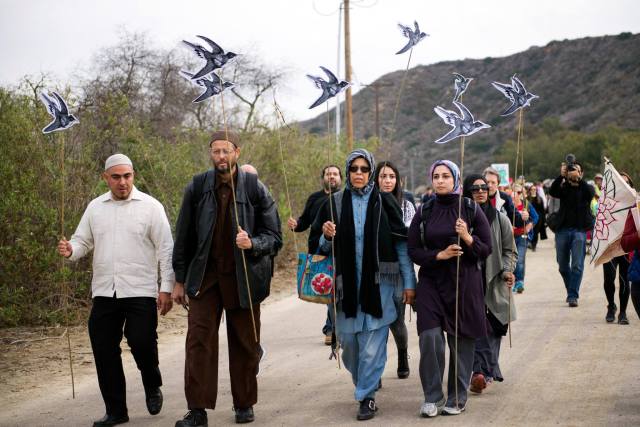
Yet, it is the work of the religious community to keep alive our moral imagination. It is the work of our religious community to refuse to forget that the injustice we see today is not inevitable. That it is human made, and so can be human unmade. And to claim both our capacity and our responsibility to create a different future.
In the coming weeks and months ahead, I know that there will be ways that we can be a part of creating that different future. I’m already seeing sparks of some new possible responses both for individuals and for our community as a whole.
But for right now, I’m still thinking about that fear I felt, and then the courage. (And repeat, and repeat…) Because I think our mission asks us to be connected to that tension, that space where we are pushed a little bit beyond our comfort zone, on behalf of a better world. And I don’t just mean in a justice-making sense – sometimes that’s easier actually, than moving out of our comfort zones in our own lives. To grow, and change, and heal, to admit mistakes, to give and also to receive help, to forgive – even ourselves. So scary!
But if this is our work – within ourselves, among our community, out in the world – then it’s so important to lean into that sense of collective courage I felt with my knees on the sand and my arms open to the universe – even with the helicopters circling and the men screaming – singing we are not afraid. It’s the same sort of courage the organizers told us the migrants reported tapping into to fuel their journey: we know we can make the journey when we go together.
This is the holy at the heart of our mission. And together we have everything we need to keep moving forward – to march, and sing, and live for liberation. And repeat, and repeat, and….
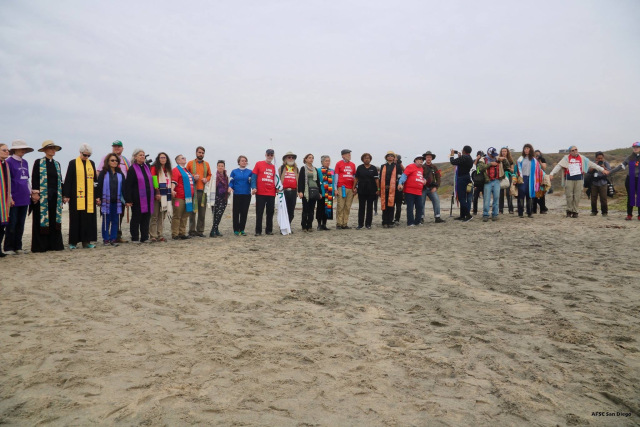
**********************
A few of the news articles reporting on the protest….
Why Were These Interfaith Leaders Arrested at the US-Mexico Border – The Nation
32 Arrested at a Demonstration Near the Mexico Border in Support of Migrant Caravan – Time
Dozens Arrested at US-Mexico Border – New York Daily News
Faith Leaders to US Authorities: Migrants have international rights to US Asylum – NBC News
**********************
* It looks like this song is an adaptation of a protest song written by the Peace Poets, an amazing group of hip hop artists grounded in the work of healing justice.